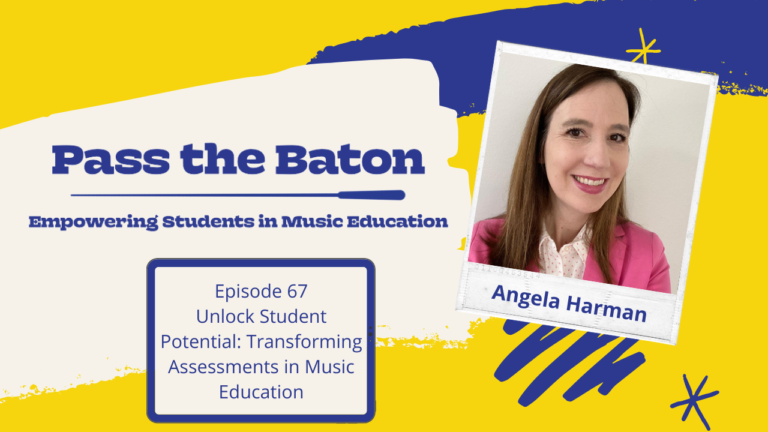This week, Kathryn and Theresa talked to Dr. Brian Weidner, an assistant professor of music education at Butler University, in Indianapolis, Indiana. Brian spent twelve years teaching high school band prior to earning a PhD from Northwestern University. Much of his work now spawned from the various questions he asked during his time teaching public school music.

Critical Thinking in Music Classes
Brian recalls an administrator discussing how much critical thinking must take place in the music room, only to realize the person doing the most critical thinking was the director! The students were engaged and active, doing everything they were told, but that ended as soon as the instruments were put in the cases. This led him to wonder, how do we build classrooms that emphasize musical independence? How do we create spaces that our students can engage in life-long and life-wide musicianship, taking what we do in the classroom and extending it into the spaces and ways of musicking that they want to be part of?
“How do we build classrooms that emphasize musical independence? How do we create spaces that our students can engage in life-long and life-wide musicianship?”
The Shift from Active Doing to Active Thinking
Brian now works to answer those questions by creating a shift from active doing to active thinking. This doesn’t replace the ensemble experience, it enhances it by giving the students more responsibility as musicians. Throughout the interview, Brian talks about how he does this and shares about:
- Having students actively make decisions in the classroom and be able to justify those decisions.
- Ensuring students have agency and a shared responsibility in the classroom, with everything from repertoire selection to rehearsal procedures.
- The importance of teachers modeling critical thinking on the podium.
- How to coach students through the process of critical thinking and problem solving as musicians, and how these skills help students self-correct and seek their own answers.
- How these techniques work with beginning students just as much as they do with high school and collegiate musicians. When we teach beginners to think critically in music classes, they don’t know it any other way!
Brian has found these active thinking skills enable students to make music independently. While that looks different from student to student, they can now make music on their own terms, and music engagement becomes part of their lives moving forward.
“It’s recognizing that it’s music making on your own terms. By doing this sort of critical thinking that asks, ‘what kind of musician do I want to be? What do I value musically, and what can I do to shape that?’ We’re setting our students up so that music engagement becomes part of their lives moving forward.”

Be sure to check out the full interview to hear more about how Brian incorporates active thinking strategies in his rehearsals, along with specific examples of what it looks like and Brian’s advice to teachers interested in trying something similar.
Student Ownership Through Active Thinking
To learn more and connect with Brian, check out these resources:
Interested in learning more about student ownership in ensembles? Check out these interviews:
- Creating a Student-Centered Choral Program, with Brian Ackels
- The Power of a Mission Statement, with Kevin Feher
- Creativity Through Music Composition (Part 2), with Robby Burns
- Creativity and Improvisation in Ensembles (Part 1), with Marissa Guarriello
Listen to the full interview on your favorite podcast platform, or here on Anchor!


